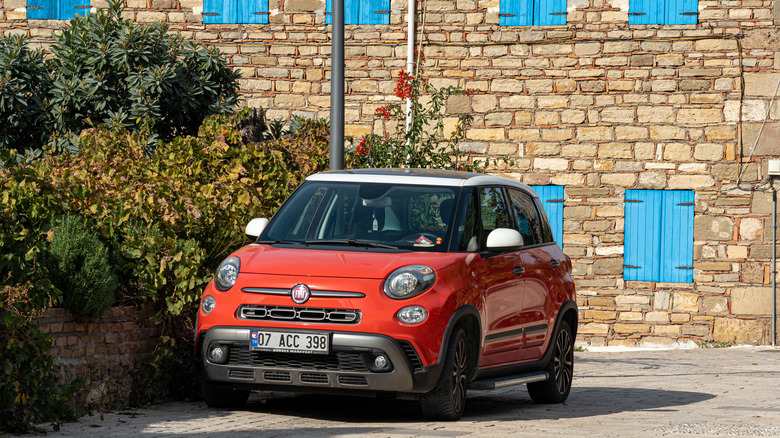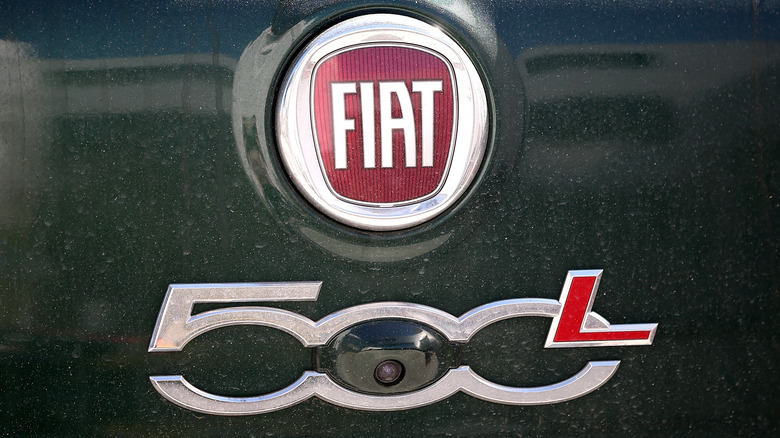The Fiat Car You Should Avoid Buying In 2025
In its "Used Cars to Avoid" roundup, U.S. News & World Report gave the 2020 Fiat 500L a 6.4 out of 10 after weighing its reliability scores, crash test results, owner satisfaction ratings, and long-term ownership costs — areas where the 500L lagged behind many rivals. When it was new in 2020, the Fiat 500L started at $23,995 for the Pop model and went up to $26,140 for the fully loaded Lounge trim. On the used market in 2025, Kelley Blue Book (KBB) lists $13,464 for a Pop to $15,953 for a Lounge.
With its relatively cheap price, KBB still slots the 500L behind the Hyundai Venue and Nissan Kicks. In KBB's list of best subcompact SUVs of 2020, the Fiat 500L comes in at #14, while the 2020 Hyundai Venue sits at #4 and the 2020 Nissan Kicks at #6. While the 500L does offer a large cargo area, its cabin uses cheap materials and the seats are uncomfortable, so that extra space may not feel like a big benefit.
RepairPal estimates the annual repair costs of the 500L at about $640, versus a $521 average for its class. That means owners will probably spend more time and money at the mechanic than they would with most competitors. If design is what you're after, the 500L throwback looks and bright color options might grab your attention. But reviews make it clear that style can't hide its faults. You can, instead, go for cheap hybrid cars under $15,000.
Choppy ride and sluggish performance
The 2020 Fiat 500L's suspension is stiff, so it feels bumpy and rough unless you stick to smooth roads. Edmunds notes that the ride gets jostled and unsettled on typical pavement, making longer trips tiring. On top of that, the car accelerates slowly — its engine takes its time getting up to speed, which can make merging or passing feel like a chore.
Car and Driver put the 500L at 4.5 out of 10 based on a hands-on road test that measured acceleration, braking, ride comfort, and handling; reviewers found its throttle response sluggish and its ride uncomfortably firm. They also found that the 1.4-liter engine takes about eight seconds to reach 60 miles per hour, and its six-speed automatic shifts roughly. That slow pick-up and jerky transmission make merging onto highways or passing other cars feel tense instead of easy.
You might expect a small wagon like the 500L to get better mileage, but the EPA rates it at just 25 miles per gallon (mpg) combined, via Edmunds. By comparison, 2020 Hyundai Venue models earn about 32 mpg combined, and the 2020 Nissan Kicks manages 33 mpg combined. That makes the 500L one of the "thirstiest" in its class and it is in the same class as a used 2021 Toyota Tundra.
Cheap cabin, outdated safety
The Fiat 500L may look compact on the outside, but its interior lets you down. Car and Driver says it provides little support; fine for short trips but uncomfortable on longer drives. On top of that, the car's tech features are basic at best. Some 2020 vehicles include a few modern driver-assistance features. For instance, the 2020 Honda Civic comes with Honda Sensing® on every model. That means it can automatically adjust your speed to keep a safe gap from the car ahead, nudge your car back into its lane if you drift, warn you if you're about to hit something, and help prevent you from veering off the road. By comparison, the Fiat 500L only gives you a rearview camera.
Even on the top trims, it doesn't offer automatic speed control, lane-drift correction, collision warnings, or side-view alerts. There are used cars that do some of that for $10,000 or less. Crash tests raise serious concerns, too. The Insurance Institute for Highway Safety (IIHS) ran a crash test that simulates hitting just the front corner of the driver's side. In that "small overlap front" test, the 2020 Fiat 500L earned a "Poor" score — IIHS's lowest rating. Vehicles that score "Good" in this test are about 12% less likely to suffer a fatal frontal crash, which means a "Poor" rating carries a higher risk of death in a similar collision. In essence, skip the 2020 Fiat 500L when shopping for a sub-compact SUV in 2025.


